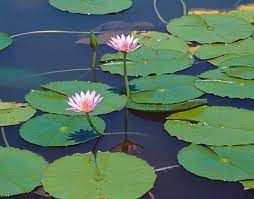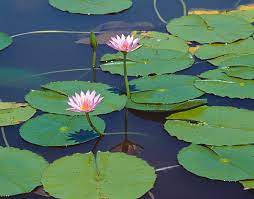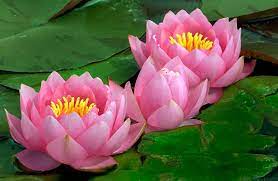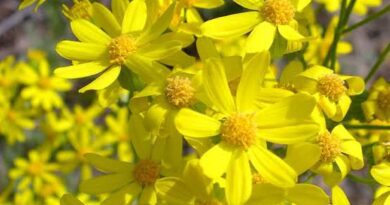10 Medicinal Health Benefits of Water-lily (Nymphaea)
Nymphaea, commonly known as water lily, is a captivating aquatic plant renowned for its beauty and remarkable medicinal properties. Beyond its aesthetic charm, Nymphaea has been cherished for centuries for its potential to enhance health and well-being.
Nymphaea are aquatic plants that grace the tranquil waters of ponds, lakes, and slow-moving streams. Their distinctive, floating leaves and radiant flowers make them a symbol of elegance and serenity.
Nymphaea belongs to the Nymphaeaceae family and thrives in freshwater habitats across the globe. Its enchanting blooms, which float gracefully on water surfaces, have earned it a place in folklore and culture.
Nymphaea’s allure has captured the imagination of cultures across history. In ancient Egypt, it held a sacred place, symbolizing rebirth and spiritual enlightenment. The stunning blooms of Nymphaea adorned ponds in royal gardens, adding a touch of elegance to the surroundings. Similarly, in Indian Ayurveda, Nymphaea was revered for its ability to balance the body’s energies, or doshas.
Fast forward to the present day, and Nymphaea is making a resurgence in the wellness sphere. As people seek holistic approaches to health, this aquatic wonder is finding its way back into our lives. Its popularity as a natural remedy is on the rise, with health enthusiasts and practitioners alike recognizing its potential to augment overall well-being.
Beyond its therapeutic qualities, Nymphaea’s ethereal beauty continues to inspire awe. Its vibrant petals, ranging from delicate whites to vibrant pinks, cast a spell of serenity. Garden enthusiasts and nature lovers often introduce Nymphaea into their outdoor spaces, creating tranquil oases that provide visual and emotional rejuvenation.
Nymphaea’s versatility is truly remarkable. From ornamental garden features to holistic medicine, it spans a wide spectrum of utility. With its various forms such as teas, tinctures, and capsules, individuals can choose the method that aligns best with their preferences and health goals.
In the grand tapestry of natural wonders, Nymphaea stands as a radiant thread, weaving through time, tradition, and transformation. As we embrace its beauty and potential, let’s also embrace the responsibility of preserving and respecting the environment that gifts us such treasures. So, take a step towards well-being, guided by the elegance of Nymphaea.
Nymphaea blooms in a kaleidoscope of colors, ranging from pristine white and gentle pinks to vibrant blues and deep purples. These colors, when reflected on the water’s surface, create a mesmerizing spectacle.
Many Nymphaea species emit a delicate, sweet fragrance that lures pollinators like bees and butterflies. The combination of visual and olfactory allure makes them a garden favorite.
Beyond their aesthetic appeal, Nymphaea plays a vital role in maintaining aquatic ecosystems. Their leaves provide shade for fish, while their submerged roots oxygenate the water, creating a healthier environment for aquatic life.
The submerged parts of Nymphaea, including their roots, release oxygen into the water during the day through a process called photosynthesis. This oxygenation benefits fish and other aquatic creatures, promoting a balanced ecosystem.
The broad, floating leaves of Nymphaea provide shade and protection for fish, frogs, and other aquatic organisms. This shelter helps these creatures evade predators and maintain their overall well-being.
Nymphaea also acts as natural filters, absorbing excess nutrients like nitrogen and phosphorus from the water. This filtration process helps prevent the overgrowth of algae, which can harm aquatic life.
Nymphaea is not just a sight to behold in serene ponds but also a treasure trove of health benefits. Nymphaea is a genus of aquatic plants found in various parts of the world. These plants are prized for their exquisite flowers, which bloom on the water’s surface, creating a picturesque scene.
Nymphaea, commonly known as water lilies, are enchanting aquatic plants admired for their exquisite beauty. However, beneath their delicate petals lies a world of secrets, including potential side effects when used for various purposes
Varieties of Nymphaea Medicinal Plant
Nymphaea comes in a myriad of species and cultivars. From the classic white water lily (Nymphaea alba) to the vibrant and exotic lotus-flowered water lily (Nymphaea lotus), there is a fascinating diversity within this botanical family.
Nymphaea alba (The White Elegance): Large, pristine white flowers with a sweet fragrance, Found in calm, freshwater bodies across Europe. This variety is renowned for its fragrant, white blossoms. It’s commonly found in North America and is used both ornamentally and medicinally.
Nymphaea lotus (The Lotus of Purity): Unique, cup-shaped flowers with pink or white petals, Native to Egypt, it thrives in warm, sunny conditions. Recognized by its vibrant red leaves and unique shape, this variety is popular among aquarium enthusiasts.
Nymphaea caerulea (The Blue Enchantment): Exquisite, sky-blue flowers with historical significance, Native to the Nile region, it grows in marshy waters. Native to Egypt, this striking blue flower has historical significance and is often associated with ancient Egyptian rituals.
Nutritional Composition of Nymphaea Medicinal Plant
Nymphaea, with its alluring appearance, also boasts an impressive nutritional profile. It contains a wide range of vitamins, minerals, and other bioactive compounds that contribute to its health-enhancing properties.
Vitamins: Nymphaea is rich in vitamins, including vitamin A, C, and various B vitamins. Vitamin A is crucial for healthy skin, vision, and immune function, while vitamin C acts as a powerful antioxidant, promoting tissue repair and immune support.
Minerals: This aquatic wonder is a source of essential minerals such as potassium, magnesium, and calcium. Potassium is vital for maintaining proper heart function and regulating blood pressure, while magnesium supports muscle and nerve function. Calcium is essential for strong bones and teeth.
Phytochemicals: Nymphaea contains phytochemicals like flavonoids and alkaloids, which have been linked to various health benefits. Flavonoids, in particular, are potent antioxidants that help combat oxidative stress and inflammation.
The Medicinal Health Benefits of Water-lily (Nymphaea)

1. Antioxidant Properties: Free radicals, those pesky molecules that can cause cellular damage, meet their match in Nymphaea’s antioxidant arsenal. Antioxidants neutralize these harmful substances, potentially reducing the risk of chronic diseases.
Nymphaea is a potent source of antioxidants, such as flavonoids and polyphenols. These compounds combat harmful free radicals, reducing oxidative stress and the risk of chronic diseases.
2. Anti-Inflammatory Abilities: Chronic inflammation is a silent troublemaker behind many health issues. Nymphaea’s anti-inflammatory properties might help alleviate inflammation and promote a healthier internal environment.
The plant’s anti-inflammatory properties can alleviate conditions like arthritis and inflammatory bowel diseases. Nymphaea helps reduce swelling and discomfort. Inflammation is a natural response by the body to injuries or infections.
However, chronic inflammation is a different story and has been linked to various health problems, including heart disease, cancer, and autoimmune disorders. Nymphaea’s anti-inflammatory properties can play a vital role in mitigating this chronic inflammation.
The bioactive compounds in Nymphaea have been studied for their potential to modulate inflammatory pathways in the body. By reducing excessive inflammation, Nymphaea may help lower the risk of chronic diseases and promote general well-being.
3. Nutritional Composition: Nymphaea boasts a rich nutritional profile, containing essential vitamins, minerals, and other bioactive compounds that contribute to its health-promoting properties.
4. Digestive Health: A happy gut often translates to overall well-being. A healthy digestive system is key to overall wellness. Nymphaea’s contribution to digestive health lies in its potential to soothe gastrointestinal discomfort and support the normal functioning of the digestive tract. It can help alleviate common issues such as indigestion and bloating.
Moreover, the presence of fiber in Nymphaea can aid in regular bowel movements and maintain a healthy gut microbiome, which is increasingly recognized as a cornerstone of good health.
5. Cardiovascular Benefits: A strong heart is essential for a long and healthy life. Nymphaea’s potential cardiovascular benefits make it an interesting contender for promoting heart health. Maintaining a healthy heart is paramount. Cardiovascular health is paramount to a long and healthy life. Nymphaea may contribute to cardiovascular well-being in several ways:
5a. Blood Pressure Regulation: The potassium content in Nymphaea can help regulate blood pressure, reducing the risk of hypertension.
5b. Cholesterol Management: Some studies suggest that Nymphaea may have a positive effect on lipid profiles, helping to lower LDL cholesterol levels.
5c. Improved Circulation: Compounds in Nymphaea may support blood vessel health, enhancing overall circulation.
These combined effects make Nymphaea a potential ally in maintaining a healthy heart.
6. Stress Reduction: Stress is an unavoidable part of modern life, but managing it is crucial. Nymphaea’s stress-reduction properties can help you find a sense of calm amidst the chaos. stress is a common adversary. Nymphaea’s potential stress-reduction properties may offer respite from the pressures of daily life. Its calming effects can help reduce anxiety and promote a sense of tranquility.
The active compounds in Nymphaea are thought to interact with neurotransmitters in the brain, promoting relaxation and improving mood. Whether in the form of herbal tea or supplements, Nymphaea could be a natural way to find your inner peace.
7. Skin Health: Beautiful skin isn’t just about what you put on it; it’s also about what you feed it from the inside. Nymphaea’s potential to enhance skin health might give you that coveted natural glow. Your skin is a reflection of your internal health.
Your skin is a reflection of your internal health, and Nymphaea has something to offer in this department too. Its antioxidant properties help protect the skin from oxidative damage caused by factors like UV radiation and pollution.
Additionally, the vitamins and minerals found in Nymphaea support skin hydration and collagen production, helping to maintain skin elasticity and a youthful appearance. Incorporating Nymphaea into your skincare routine could leave you with a healthy, radiant complexion.
8. Pain Management: Chronic pain can be debilitating. Chronic pain can be a daily struggle for many individuals. Nymphaea’s potential as an analgesic agent is intriguing. Some studies suggest that it may help alleviate various types of pain, including headaches, menstrual cramps, and muscle aches.
While more research is needed to fully understand the mechanisms behind this pain-relieving effect, Nymphaea presents an exciting avenue for those seeking natural pain management solutions.
9. Weight Management: Maintaining a healthy weight is a universal goal. Nymphaea’s potential influence on metabolism and weight management makes it a valuable addition to your regimen. By adding Nymphaea to your diet or wellness plan, you might find it easier to control your appetite and make healthier food choices, ultimately contributing to your weight management goals.
10. Enhancing Cognitive Function: A sharp mind is a valuable asset. A sharp and focused mind is invaluable in today’s information-driven world. Nymphaea’s potential cognitive benefits are promising. Some studies suggest that it may enhance memory, attention, and overall cognitive function.
The bioactive compounds in Nymphaea are believed to support brain health by protecting neurons and enhancing neurotransmitter function. While it’s not a magical solution for brain health, incorporating Nymphaea into your lifestyle could be a proactive step toward mental clarity and acuity.
Read Also: 7 Medicinal Health Benefits of Daffodils (Narcissus Plant)
The Methods of Usage to Achieve the Provided Health Benefits of Water-lily (Nymphaea)
1. Nymphaea Tea: A Soothing Brew: One of the most popular ways to enjoy Nymphaea’s benefits is by brewing a fragrant and soothing tea. Steep Nymphaea petals in hot water and savor its calming effects. The process involves steeping dried Nymphaea petals in hot water. This infusion can promote relaxation and reduce stress.
2. Nymphaea Tinctures: Tinctures are liquid extracts of Nymphaea. They offer a convenient and potent way to experience the plant’s benefits. Tinctures offer a concentrated form of Nymphaea’s goodness. A few drops under the tongue can quickly provide relief from various ailments.
3. Nymphaea Capsules: Convenience in a Pill: For those on the go, Nymphaea capsules provide a convenient way to incorporate this herbal remedy into their daily routine. It ensures a consistent dosage.
4. Nymphaea Supplements: For those seeking a more controlled dosage, Nymphaea supplements in the form of capsules or powders are available in the market. These provide a consistent intake of the plant’s active compounds.
5. Topical Applications: Nymphaea’s benefits aren’t limited to internal use. It can also be applied topically. The plant’s soothing properties make it a valuable ingredient in skincare products. It can help with conditions like eczema and acne.
6. Nymphaea in Aromatherapy: The delicate fragrance of Nymphaea can be harnessed in aromatherapy. Inhaling its aroma can promote relaxation and mental clarity.
7. Combining Nymphaea with Other Herbs: Nymphaea can be combined with other herbs like lavender or chamomile to enhance its effects. These herbal blends create potent remedies.
Read Also: Pests of Stored Products and Damages Caused
The Side Effects of Using Water-lily Medicinal Plant
1. Allergic Reactions: While rare, some individuals may experience allergic reactions to Nymphaea. This can manifest as skin rashes, itching, or respiratory issues. Always perform an allergy test before use.
2. Digestive Disturbances: Excessive consumption of Nymphaea may lead to digestive problems like nausea or diarrhea. Moderation is key.
3. Drowsiness and Dizziness: In some cases, Nymphaea’s calming effects may cause drowsiness or dizziness. Avoid operating heavy machinery after use.
4. Interaction with Medications: Nymphaea may interact with certain medications, potentially affecting their effectiveness. It’s crucial to consult with a healthcare professional before combining Nymphaea with prescription drugs.
Precautions and Recommendations in Using Water-lily Medicinal Plant

While Nymphaea has gained attention for its possible health benefits, it is essential to exercise caution.
1. Drug Interactions: As mentioned earlier, Nymphaea may interact with certain medications. If you are taking prescription drugs, consult your healthcare provider before using Nymphaea products.
2. Quality Control: The quality of Nymphaea products can vary, so it’s crucial to purchase them from reputable sources. Look for products that undergo rigorous testing for purity and potency.
3. Allergic Sensitivity: Individuals with a history of allergies should be especially cautious when trying Nymphaea-based products. Even though it is considered safe for most people, allergic reactions can occur.
4. Individual Response: Just like any herbal remedy, how Nymphaea affects you can be unique. Factors like your body’s chemistry, metabolism, and overall health play a role in determining the impact.
5. Consistency Matters: To fully harness the health benefits of Nymphaea, consistency is key. Whether you choose to brew Nymphaea tea, use tinctures, or apply it topically, sticking to a regular regimen can yield more pronounced results over time.
6. Patience Is a Virtue: While some people might experience immediate benefits, others may require more time to notice the effects. Be patient and allow your body to adapt to this natural remedy.
7. Holistic Approach: Nymphaea is not a miracle cure. It is most effective when integrated into a holistic wellness routine that includes a balanced diet, regular exercise, and adequate sleep.
8. Dosage Guidelines: The appropriate dosage of Nymphaea can vary from person to person. It’s advisable to start with a small amount and gradually increase it while monitoring its effects on your body.
9. Duration of Use: Nymphaea can be used periodically to address specific health concerns or as a daily supplement for overall well-being. Consulting a healthcare professional can provide personalized guidance.
10. Medical Consultation: If you have underlying health conditions or are taking medications, consult with a healthcare provider before incorporating Nymphaea into your wellness routine.
FAQs About Water-lily Medicinal Plant
1. Is Nymphaea safe for pregnant women?
Nymphaea should be avoided during pregnancy due to its potential to induce uterine contractions.
2. Can Nymphaea be used to treat insomnia?
Yes, Nymphaea’s calming properties may help with insomnia. However, consult a healthcare provider for personalized advice.
3. Are there any known drug interactions with Nymphaea?
Nymphaea may interact with certain medications. Always inform your doctor about any herbal remedies you’re using.
4. Can I grow Nymphaea at home?
Yes, Nymphaea can be cultivated in home ponds or containers. It adds beauty to your surroundings and may be harvested for medicinal use.
5. Where can I find high-quality Nymphaea products?
You can find Nymphaea products at reputable herbal stores or online retailers. Ensure they are sourced from trusted suppliers for optimal quality.
6. Is Nymphaea addictive?
No, Nymphaea is not addictive. It lacks the addictive properties associated with some pharmaceutical drugs.
7. Can Nymphaea be used to treat skin conditions?
Some anecdotal evidence suggests that Nymphaea extracts may benefit certain skin conditions. Consult a dermatologist for guidance.
8. Are there any age restrictions for using Nymphaea products?
Nymphaea products are generally safe for adults. However, consult a pediatrician before administering them to children.
9. How can I differentiate between Nymphaea species?
Distinguishing between Nymphaea species can be challenging for the untrained eye. Consult a botanist or rely on reputable suppliers for accurate identification.
10. Can Nymphaea be used as an aphrodisiac?
Nymphaea has historically been associated with aphrodisiac properties, but scientific evidence is limited. Its effects can vary between individuals.
11. Can Nymphaea be used for skincare?
Yes, Nymphaea’s antioxidants can benefit the skin. Its extracts are found in skincare products, offering protection against environmental damage.
12. What’s the ideal dosage of Nymphaea?
Dosage varies depending on the form of Nymphaea and individual factors. Always follow the recommended guidelines on product packaging.
13. Does Nymphaea have a role in pain management?
Nymphaea’s anti-inflammatory properties may provide mild pain relief. Consult a healthcare professional for chronic pain concerns.
14. Can Nymphaea be cultivated indoors?
Yes, certain varieties of Nymphaea can thrive in indoor aquatic environments like fish tanks or decorative water containers.
15. Are all water lilies the same?
No, there are numerous species and cultivars of water lilies, each with its own unique characteristics.
16. Can I grow water lilies in a small backyard pond?
Yes, there are dwarf varieties of water lilies suitable for smaller ponds and containers.
17. How do I care for water lilies in the winter?
In colder climates, you should move potted water lilies to deeper water or bring them indoors for the winter.
18. Are water lilies endangered?
Some species of water lilies are threatened by habitat loss, so it’s essential to protect their natural habitats.
19. Do all water lilies have fragrant flowers?
No, while many water lilies are fragrant, not all of them emit a noticeable fragrance.
20. Can I grow water lilies in a container or small tub?
Yes, you can cultivate certain dwarf varieties of water lilies in containers or small tubs, provided they receive adequate sunlight and care.
21. Are water lilies suitable for koi ponds?
Yes, water lilies are often a great addition to koi ponds as they provide shade and help maintain water quality.
Read Also: Relationship Marketing Process and Approaches to the Study of Marketing









